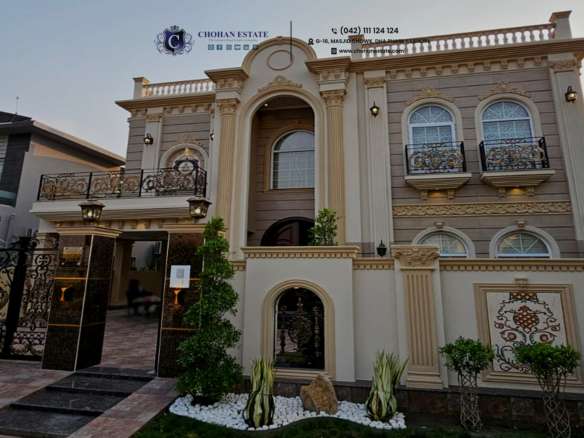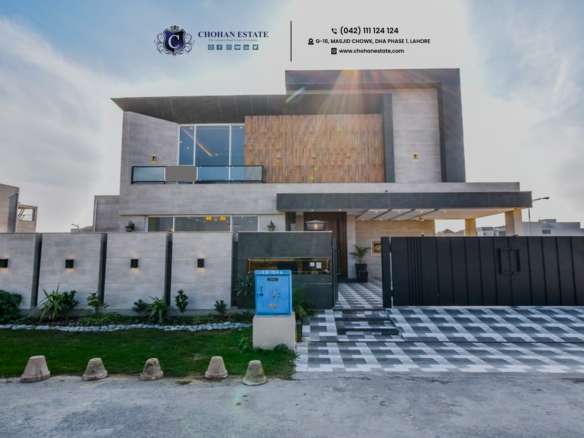This blog will cover recent shifts, emerging trends, and key projections for the real estate landscape, backed by relevant industry insights and market conditions.
The real estate sector in Pakistan is set to experience significant shifts in 2024 as developers, investors, and property seekers adapt to changing economic conditions, technological advancements, and government policies. From digitalization and sustainability to new residential and commercial hubs, several trends are shaping the market this year.
In this blog, we’ll explore the top real estate trends for 2024, providing insights into where the market is headed and the opportunities available for various stakeholders.
Rise of Smart and Sustainable Housing
With urbanization accelerating across Pakistan, the demand for smart, eco-friendly housing solutions has increased dramatically. This shift is partly driven by younger, environmentally conscious buyers and developers seeking to meet global standards in sustainability.
Key Insights:
- Smart Homes: Automated systems that control lighting, security, and energy usage are becoming popular, especially in high-end areas of cities like Karachi, Islamabad, and Lahore.
- Green Buildings: Developers are incorporating energy-efficient designs and materials, such as solar panels and low-energy appliances, to create sustainable housing projects. Areas like DHA and Bahria Town are seeing new projects that emphasize green building standards.
- Government Initiatives: The government’s increased focus on green energy and building codes is encouraging developers to adopt sustainable practices to attract incentives and reduce operational costs in the long run.
As demand grows, these eco-conscious housing options could become mainstream across mid-tier developments, offering environmentally friendly options to a broader demographic.
Expansion of Real Estate Technology (PropTech)
PropTech is reshaping how property transactions are conducted in Pakistan, providing digital tools for buying, selling, and managing real estate. This trend was accelerated by the COVID-19 pandemic and is expected to continue evolving.
Key Insights:
- Virtual Property Tours and Online Marketplaces: With platforms like Chohan Estate, Zameen, and OLX Property, potential buyers can explore properties remotely. Virtual tours, digital documentation, and online property valuation tools add convenience and transparency.
- AI and Big Data Analytics: Real estate companies use AI-powered algorithms and data analytics to identify market trends and predict property values, allowing more informed investment decisions.
- Blockchain for Secure Transactions: Blockchain technology is slowly being introduced to enable more secure and transparent property transactions, reducing fraud risks.
The adoption of PropTech is likely to enhance the real estate market’s efficiency and appeal, especially to younger buyers who prefer digital solutions.
Increasing Demand for Mixed-Use Developments
As urban centers grow, mixed-use developments—integrating residential, commercial, and recreational spaces—are gaining traction in Pakistan. These developments meet the need for more versatile spaces, particularly in urban areas where land is limited.
Key Insights:
- Urban Convenience: Mixed-use projects like Mall of Lahore and Centaurus Mall in Islamabad combine shopping, entertainment, and residential spaces, offering greater convenience and accessibility.
- Live-Work Spaces: Demand for spaces that combine living and working environments is rising as remote and hybrid work models gain popularity. This trend is leading to mixed-use developments with co-working spaces.
- Developer Initiatives: Leading real estate companies are focusing on high-density projects, particularly in areas like Karachi and Lahore, to optimize limited urban land.
With an increasing focus on lifestyle amenities, the demand for mixed-use developments will likely drive significant real estate growth in densely populated areas.
Emergence of Affordable Housing Schemes
As housing prices continue to rise, affordable housing remains a critical need in Pakistan. The government’s efforts to address this issue through various schemes are shaping the real estate landscape.
Key Insights:
- Government Programs: Initiatives like the Naya Pakistan Housing Program are making homeownership more accessible to low- and middle-income families by offering subsidized financing and low-cost housing projects.
- Partnerships with Private Developers: Public-private partnerships are becoming common, with private developers working with the government to expand affordable housing options in both urban and rural areas.
- Microfinance Institutions: Institutions like Khushhali Microfinance Bank offer financial solutions that make it easier for low-income individuals to invest in real estate.
As the demand for affordable housing grows, especially in major urban centers, we can expect more government-backed and private-sector projects aimed at meeting this need.
Growth in Commercial Real Estate Investment
As Pakistan’s economy gradually recovers, commercial real estate is becoming increasingly attractive to investors. This segment is seeing substantial investment, especially in major cities where demand for office spaces, shopping malls, and warehouses is high.
Key Insights:
- Retail and Office Spaces: Cities like Karachi, Lahore, and Islamabad are experiencing a surge in demand for premium office and retail spaces, driven by the expansion of businesses and foreign brands entering the Pakistani market.
- Warehouse and Industrial Spaces: E-commerce growth is driving demand for logistics and warehousing facilities. Industrial hubs near motorways and in special economic zones are emerging as prime areas for warehouse investments.
- Hospitality Sector: With an uptick in domestic tourism, there’s rising demand for hotels, guest houses, and resorts, particularly in northern Pakistan and areas close to tourist destinations like Murree and Skardu.
Investors seeking to diversify their portfolios are eyeing commercial real estate as a viable option, given its steady income potential and rising demand across various sectors.
Government Policy Impact on Real Estate
Government policies and regulations play a significant role in shaping the real estate market in Pakistan. In 2024, several policies are expected to influence the market in substantial ways.
Key Insights:
- Real Estate Regulatory Authority (RERA): The introduction of RERA in several provinces aims to protect buyer interests and bring transparency to the property market. This move could help regulate the industry and make it more investor-friendly.
- Tax Reforms: Adjustments to property tax regulations are impacting investment decisions. Recent tax reforms, including revised capital gains tax (CGT) and withholding tax (WHT) policies, may affect property transfer and ownership costs.
- Investment-Friendly Policies: The government is focusing on foreign direct investment (FDI) in real estate, particularly through the CPEC project, which is likely to bring in more international investors and developers.
Understanding government policies is essential for investors who wish to navigate the real estate market effectively and capitalize on opportunities that align with policy shifts.
Rise in Real Estate Investment through Overseas Pakistanis
Remittances from overseas Pakistanis remain a substantial contributor to the real estate sector. This trend is expected to continue as Pakistanis abroad view local property as a secure investment option.
Key Insights:
- High Returns on Investment: Property prices in Pakistan’s major cities, especially in housing societies like DHA and Bahria Town, have shown a steady appreciation, making them attractive to overseas investors.
- Ease of Investment: Many developers are now offering online booking, virtual tours, and secure payment methods to make investment easier for Pakistanis living abroad.
- Incentives for Overseas Pakistanis: The government has introduced schemes and incentives, including tax rebates and simplified remittance channels, to attract more overseas investment.
This trend is expected to bring further growth to the market, especially in premium areas, as overseas investors continue to channel their savings into Pakistan’s real estate sector.
Increased Focus on Real Estate Education and Professionalism
As the real estate sector grows in complexity, the need for professionalism and real estate education is becoming apparent. Many agencies are focusing on training programs, certifications, and professional standards to improve service quality.
Key Insights:
- Professional Certifications: Real estate companies are increasingly seeking agents with formal training and certifications to improve client trust and market credibility.
- Real Estate Institutes and Courses: Institutions like the Pakistan Institute of Real Estate (PIRE) are offering specialized training and courses on property laws, market analysis, and sales techniques.
- Focus on Ethics and Transparency: The real estate sector is emphasizing ethical standards to protect clients and provide a transparent transaction process.
This focus on education and professionalism will likely enhance the quality of service in the real estate industry, building greater trust among clients and investors.
Summary
The real estate landscape in Pakistan for 2024 presents both opportunities and challenges for investors. Key trends, such as the rise of sustainable housing, the expansion of PropTech, increased interest in mixed-use developments, and the focus on affordable housing, are expected to reshape the market.
For investors, understanding these trends and the evolving regulatory framework is crucial for making informed decisions. Whether you are a first-time investor or an experienced real estate player, staying updated on market dynamics will help you navigate the complexities of the sector and capitalize on emerging opportunities.
As Pakistan’s real estate market continues to grow and mature, the future looks promising for those willing to invest strategically in this dynamic sector.





Join The Discussion